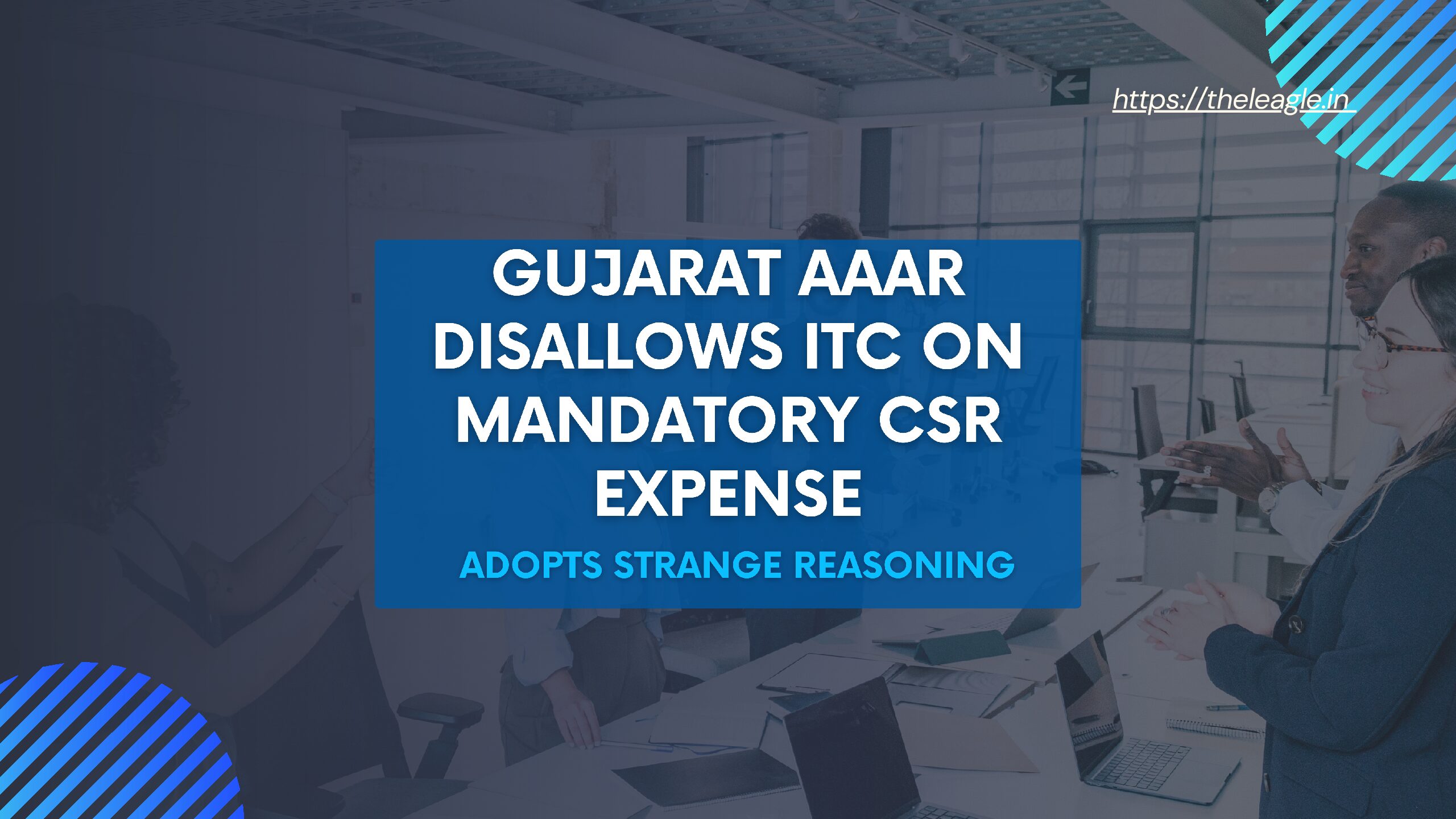Gujarat Appellate Authority for Advance Ruling (‘Gujarat AAAR’) in a recent ruling[1] has concluded that the applicant was not allowed to claim ITC on inputs and input services for mandatory expenditure made in pursuance of Section 135, Companies Act, 2013. The answer to this question should have been obvious after the amendment to CGST Act, 2017 via the Finance Act, 2023. However, the Gujarat AAAR referred to GST Council meetings, IT Act, 1961 in an unnecessary exercise of providing superfluous reasons for its conclusion.
Introduction
The applicant, in the first instance, approached Gujarat Authority for Advance Ruling (‘Gujarat AAR’) to seek answer to the following question: whether the inputs and input services procured by the applicant to undertake mandatory CSR activities as required under Section 135 of the Companies Act, 2013 qualify as being in the course and furtherance of business and are eligible for ITC under Section 16, CGST Act, 2017. The Gujarat AAR answered in the negative and primarily relied on the definition of CSR under Company (CSR Policy) Rules, 2014 to hold that as CSR activities are excluded from the normal course of business activities of the applicant, ITC cannot be claimed for such activities.
The applicant appealed to Gujarat AAAR and assailed the Gujarat AAR’s interpretation on various grounds. The applicant, for example, correctly challenged the Gujarat AAR’s decision on the ground that there was no nexus between the definition of CSR under Company (CSR Policy) Rules, 2014 and eligibility to claim ITC under Section 16, CGST Act, 2017. The applicant also alternatively argued that Section 16, CGST Act, 2017 uses the phrase ‘in course and furtherance of business’ while Company (CSR Policy) Rules, 2014 use the phrase ‘normal course of business’ and that Gujarat AAR erred in interpreting both the phrases to mean the same thing.
Gujarat AAAR’s Reasoning and Conclusion
As stated above, the answer to the applicant’s question should have been straightforward with the Gujarat AAAR relying on Section 139, Finance Act, 2023 which introduced the following clause to Section 17(5), CGST Act, 2017:
“fa) goods or services or both received by a taxable person, which are used or intended to be used for activities relating to his obligations under corporate social responsibility referred to in section 135 of the Companies Act, 2013;
Section 17(5), CGST Act, 2017 enumerates the situations in which ITC is blocked, and the insertion of above clause in Section 17(5), CGST Act, 2017 means that goods or services or both used to fulfil mandatory CSR obligations will not be eligible for ITC. And as a result of this deeming fiction, mandatory CSR activities will not be considered as activities ‘in the course of business’.
Instead, the Gujarat AAAR chose to arrive at this conclusion via a circuitous route: it referred to the decision of the 48th GST Council to disallow ITC on mandatory CSR activities, cited a paragraph of the relevance of GST Council recommendations under the GST regime. (para 17) It then unnecessarily referred to the fact that IT Act, 1961 disallowed expenditure to an assessee for mandatory CSR activities. (para 16) Reference to all the above sources was and is perhaps necessary to resolve an ambiguity or an uncertainty in a statutory provision. In such cases, it is incumbent on adjudicating body to refer to additional sources in order to decide the case and/or answer specific queries.
In the impugned case, the question was straightforward and the legal position amply clear after the amendment made to Section 17, CGST Act, 2017 via the Finance Act, 2023. Gujarat AAAR could have simply referred to the amended provision and answered the applicant’s query instead of stating multiple reasons and making unnecessary references to IT Act, 1961. Gujarat AAAR’s ruling in the impugned case is an example of arriving at the right conclusion by using superfluous reasoning.
Conclusion
It is hoped that the relevant authorities – AAR/AAAR – will adopt more precise reasoning and arrive at proper conclusions instead of referring to sources that have no relevance in interpreting a statutory provision that contains no ambiguity. It would prevent unnecessary confusion that may arise in the mind of taxpayers who are similarly situated or otherwise.
[1] Re: M/s. Adama India Private Limited, GUJ/GAAR/APPEAL/2023/04, dated 26.09.2023. Available at https://taxguru.in/wp-content/uploads/2023/10/In-re-Adama-India-Private-Limited-GST-AAR-Gujrat.pdf (Last accessed on 10.10.2023).
